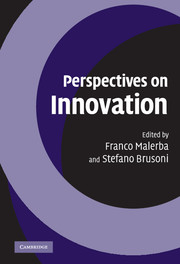Book contents
- Frontmatter
- Contents
- List of figures
- List of tables
- List of contributors
- Prefatory note
- Introduction
- Part 1 Innovation and economic growth
- Part 2 The microdynamics of the innovation process
- Part 3 Innovation and industrial dynamics
- Part 4 Innovation and institutions
- Part 5 Innovation, firms' organization, and business strategies
- Part 6 Innovation and entrepreneurship
- Part 7 Innovation and evolution of the university system
- Part 8 Innovations and public policy
- 15 Innovation systems, innovation policy and restless capitalism
- 16 Intellectual property rights and competition policy
- 17 The policy-shaper's anxiety at the innovation kick: how far do innovation theories really help in the world of policy?
- Index
15 - Innovation systems, innovation policy and restless capitalism
Published online by Cambridge University Press: 06 January 2010
- Frontmatter
- Contents
- List of figures
- List of tables
- List of contributors
- Prefatory note
- Introduction
- Part 1 Innovation and economic growth
- Part 2 The microdynamics of the innovation process
- Part 3 Innovation and industrial dynamics
- Part 4 Innovation and institutions
- Part 5 Innovation, firms' organization, and business strategies
- Part 6 Innovation and entrepreneurship
- Part 7 Innovation and evolution of the university system
- Part 8 Innovations and public policy
- 15 Innovation systems, innovation policy and restless capitalism
- 16 Intellectual property rights and competition policy
- 17 The policy-shaper's anxiety at the innovation kick: how far do innovation theories really help in the world of policy?
- Index
Summary
Introduction
In this chapter I outline the rationale for innovation policy from an evolutionary economic perspective, a perspective built around the dynamic properties of ‘restless capitalism’ and the concept of the adaptive policy-maker. The foundations of an evolutionary rationale stand in sharp contrast to the traditional ‘market failure’ and optimising policy-maker perspectives because, from an evolutionary viewpoint, markets are instituted devices ‘designed’ to promote the growth of knowledge and its application through innovation and the self-transformation of economic arrangements. The alleged failures are in fact the sine qua non of a market process. My starting point is Richard Nelson's view that market and non-market arrangements and processes are complementary elements in the innovative division of labour and that each sphere consists of an array of vastly different organisational forms and instituted rules that precludes any simple idea that markets can fail or that governments can fail (Nelson, 2002). Markets may be too extensive or too limited and the same is the case for their non-market alternatives; it is all a matter of the relative advantages of broad organisational form and thus where the boundaries should be drawn. In this context, I shall argue that the innovation systems concept is the natural frame in which to design adaptive policy initiatives but that these initiatives are necessarily general and facilitating and not specific and directing. Innovation is part of the complex dynamics of capitalism; it is the major source of business uncertainty and the basis of the open-ended unpredictable evolution of the system. Innovation policy of all policy arenas needs to be built from these fundamental facts and the highly ordered but non-equilibrium nature of the economic process.
- Type
- Chapter
- Information
- Perspectives on Innovation , pp. 441 - 454Publisher: Cambridge University PressPrint publication year: 2007
- 11
- Cited by



